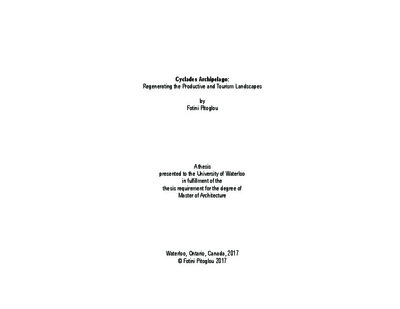| dc.description.abstract | Through history the shifting dynamics of urban and regional development in Greece’s Cyclades Archipelago shaped its overall identity and its islands’ social, economic and political cohesion. Nowadays the emerged tourism industry constitutes the main dynamic and has affected all the facets of the communities’ existence. In particular, tourism is inscribed by globalization processes that have resulted in a monopoly economy and a “new global cultural economy of space” [1] discarding the (until recent years well-preserved) Cyclades’ identity. Each island of the Cyclades Archipelago has experienced these impacts to different degrees according to its stage of tourist resort evolution [2], which in turn is highly associated with the seasonality of the island’s landscape [3], and the period required for reaching that more developed stage.
Departing from the analysis of the tourism landscape and the globalization processes that it induces, this thesis proposes a diversified economy that takes advantage of the islands informal production while it transmits the intangible cultural heritage to the global traveler through a slow process of experiencing culture. It suggests a network of co-dependencies in Cyclades between its productive and tourism landscapes that mutually benefits locals and the visitors. In its conclusion, this thesis is about regenerating the Cyclades communities, while creating enriching experiences for global travelers via their constructive blend.
------------
1. Theano Terkenli, “Landscapes of tourism: towards a global cultural economy of space?”, Tourism Geographies 4, no: 3 (2002): 227-254.
2. Πάρις Τσάρτας, “Σχεδίασμα των σταδίων ανάπτυξης του τουρισμού στο νομό Κυκλάδων“, (Επιθεώρηση Κοινωνικών Ερευνών 70, 1988): 191-210.
3. Theano Terkenli, “Human Activity in Landscape Seasonality: The Case of Tourism in Crete”. Landscape Research 30, no: 2 (2007): 221-239. | en |

